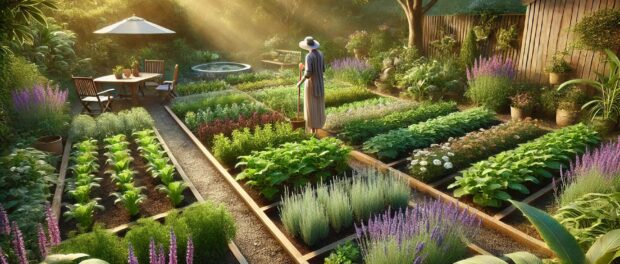8 Physical & Mental Benefits of Gardening

Holistic health is an approach to well-being that considers the mind, body, and spirit as interconnected elements. It emphasizes natural and sustainable methods to enhance health, reduce stress, and promote longevity. Gardening, a practice deeply rooted in nature, aligns seamlessly with holistic health principles, offering numerous physical, mental, and emotional benefits. This article
explores the relationship between holistic health and gardening, highlighting their synergies and practical applications for a healthier lifestyle.
The Connection Between Holistic Health and Gardening
Gardening is more than just a pastime; it is a therapeutic practice that nurtures both the body and the soul. Holistic health seeks to address overall well-being by integrating natural healing, mindfulness, nutrition, and sustainable living; all of which are inherent in gardening. By growing your own food, engaging with nature, and fostering a sense of self-sufficiency, you can enhance your health in ways that modern medicine often overlooks.
Physical Benefits of Gardening
- Exercise and Movement: Gardening involves a range of physical activities such as digging, planting, weeding, and watering, which contribute to cardiovascular health, muscle strength, and flexibility.
- Fresh, Organic Produce: Growing your own fruits, vegetables, and herbs ensures that you have access to pesticide-free, nutrient-dense food, enhancing your overall diet.
- Soil Microbes and Immunity: Exposure to beneficial soil microbes like Mycobacterium vaccae has been shown to boost immune function and reduce inflammation.
- Better Sleep and Reduced Pain: Regular outdoor activity and natural sunlight help regulate circadian rhythms, leading to improved sleep quality and pain management.
Mental and Emotional Benefits of Gardening
- Stress Reduction: Time spent in a garden has been linked to lower cortisol levels, reducing stress and promoting relaxation.
- Mindfulness and Meditation: Gardening encourages mindfulness by requiring focus on the present moment, fostering a meditative state that can alleviate anxiety and depression.
- Sense of Accomplishment: Cultivating plants and watching them grow creates a sense of achievement, boosting self-esteem and mental resilience.
- Connection to Nature: Engaging with natural cycles and seasonal changes instills a deeper appreciation for the environment and promotes emotional well-being.
Gardening as a Holistic Health Practice
To integrate gardening into a holistic health regimen, consider the following approaches:
- Permaculture and Regenerative Gardening Permaculture principles emphasize sustainability, biodiversity, and working with nature rather than against it. Practices such as companion planting, composting, and natural pest control align with holistic health by minimizing exposure to harmful chemicals and preserving soil health.
- Herbal Medicine and Healing Gardens
Growing medicinal herbs like lavender, chamomile, mint, and echinacea allows for the creation of natural remedies for common ailments. Herbal teas, tinctures, and salves derived from homegrown plants can support digestion, immunity, and relaxation. - Organic and Biodynamic Gardening
Organic gardening avoids synthetic fertilizers and pesticides, ensuring that plants retain their nutritional integrity. Biodynamic gardening takes it a step further, considering cosmic rhythms and soil vitality to enhance plant health and nutrient density. - Forest Gardening and Edible Landscaping
A forest garden mimics natural ecosystems by incorporating layers of edible plants, from fruit trees to ground cover. This approach not only provides diverse, nutrient-rich foods but also promotes biodiversity and self-sustaining agriculture. - Gardening for Mental Wellness
Creating a sanctuary garden with elements like water features, aromatic plants, and comfortable seating encourages meditation and relaxation. Engaging in activities like barefoot gardening, where direct contact with the earth (earthing) enhances grounding and emotional balance, further supports holistic health.
Final Thoughts
Holistic health and gardening share a profound connection, offering pathways to physical vitality, mental clarity, and spiritual harmony. Gardening is an immersive, therapeutic practice that nurtures both the body and the soul. By cultivating a garden with intention and mindfulness, individuals can foster a deeper relationship with nature, gaining a sense of purpose and fulfillment that extends beyond the soil. The rhythmic, meditative act of planting, tending, and harvesting can reduce stress, lower cortisol levels, and promote overall mental well-being. Additionally, exposure to fresh air, sunlight, and beneficial microorganisms in the soil contributes to improved immune function and vitality.
Beyond personal health benefits, gardening encourages sustainability by fostering a direct connection to the food we eat and the land that sustains us. Growing organic fruits and vegetables ensures that individuals consume nutrient-dense, chemical-free produce, enhancing digestion, energy levels, and long-term wellness. Likewise, medicinal herb gardening offers a natural alternative to synthetic remedies, empowering individuals to harness the healing properties of plants for common ailments. From soothing chamomile and immune-boosting echinacea to anti-inflammatory turmeric and calming lavender, herbs have been used for centuries to support holistic health.
Incorporating permaculture principles further deepens the relationship between gardening and holistic living. By designing gardens that work in harmony with nature, individuals create self-sustaining ecosystems that require less intervention while yielding greater abundance. Companion planting, composting, rainwater harvesting, and no-till methods reduce environmental impact and enhance biodiversity, reinforcing the balance between human needs and ecological stewardship.
Ultimately, gardening is a timeless and invaluable tool for holistic living, blending the physical, mental, and spiritual aspects of health into a deeply rewarding practice. Whether cultivating a small container garden, tending to an expansive permaculture plot, or simply growing culinary herbs on a windowsill, the act of gardening reconnects us with the rhythms of the natural world and enriches our journey toward a healthier, more conscious lifestyle.



